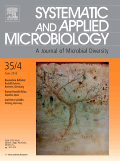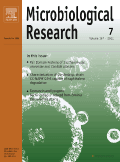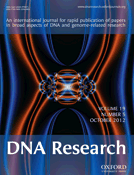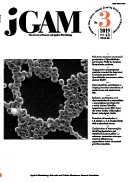
Microbiology Resource Announcements
Scope & Guideline
Connecting researchers with cutting-edge microbiology insights.
Introduction
Aims and Scopes
- Genome Sequencing of Microorganisms:
The journal emphasizes the publication of complete genome sequences of bacteria, fungi, viruses, and archaea, often focusing on strains with unique properties, including pathogenicity, antibiotic resistance, and biotechnological potential. - Metagenomics and Microbial Diversity:
It publishes studies on metagenome-assembled genomes (MAGs) that elucidate the diversity of microbial communities in various environments, including extreme habitats, agricultural systems, and clinical settings. - Genomic Characterization of Pathogens:
Research articles often include genomic characterizations of pathogens, providing insights into their virulence mechanisms, antibiotic resistance, and genetic diversity. - Bacteriophage Research:
The journal features studies on bacteriophages, including their genome sequences and applications in phage therapy, particularly against antibiotic-resistant bacterial strains. - Functional Genomics and Biocontrol Agents:
There is a focus on functional genomics studies that explore the roles of microorganisms in biocontrol, plant growth promotion, and bioremediation. - Comparative Genomics:
The journal encourages comparative genomics studies to highlight evolutionary relationships among microbial strains and their ecological adaptations.
Trending and Emerging
- Antimicrobial Resistance Genomics:
There is an increasing focus on the genomic characterization of antimicrobial resistance genes in various bacterial species, highlighting the public health implications of antibiotic resistance. - Microbial Biocontrol and Plant Growth Promotion:
Research on microbial strains that act as biocontrol agents or promote plant growth is gaining traction, reflecting an interest in sustainable agricultural practices. - Viral Metagenomics and Phage Therapy:
Emerging studies on viral metagenomics, especially concerning bacteriophages and their therapeutic applications against antibiotic-resistant bacteria, are trending. - Microbial Interactions and Community Dynamics:
There is a growing interest in understanding microbial interactions within communities, especially in relation to environmental changes, agricultural practices, and human health. - Pathogen Genomics and Epidemiology:
The journal is seeing more submissions related to the genomic epidemiology of pathogens, particularly those affecting humans and livestock, indicating a trend towards using genomic data for tracking disease outbreaks.
Declining or Waning
- Traditional Microbial Physiology Studies:
There has been a noticeable decline in publications focused solely on traditional physiological studies of microorganisms without genomic data, as the trend shifts towards genomics and metagenomics. - Niche and Rare Microorganisms:
Research on niche microorganisms that do not have immediate applications or relevance to broader microbiological or biotechnological contexts is less frequently reported. - Environmental Microbiology without Genomic Insights:
Studies that explore environmental microbiology without incorporating genomic insights or metagenomic analysis are becoming less common, as the field moves towards integrating genomic data for a more comprehensive understanding.
Similar Journals

BMC MICROBIOLOGY
Innovating the future of microbiology, one study at a time.BMC Microbiology is a leading open access journal published by BMC, dedicated to advancing the field of microbiology since its inception in 2001. With an ISSN of 1471-2180, this journal provides a vital platform for researchers, professionals, and students to share and access high-quality research and innovation in both general and medical microbiology. Based in the United Kingdom, BMC Microbiology holds a commendable Q2 ranking in both various microbiological categories according to the 2023 Scopus rankings, indicating its strong influence in the microbiological community, with a rank of #47 out of 140 in Medical Microbiology and #62 out of 182 in general Microbiology. The journal's commitment to open access ensures that groundbreaking research is freely available to facilitate collaboration and knowledge sharing among the global community of microbiologists. With a focus on publishing original research, reviews, and case studies, BMC Microbiology plays a critical role in disseminating information that can impact health and environmental conditions around the world.

SYSTEMATIC AND APPLIED MICROBIOLOGY
Elevating Standards in Microbiological ResearchSYSTEMATIC AND APPLIED MICROBIOLOGY, with ISSN 0723-2020 and E-ISSN 1618-0984, is a prestigious journal published by Elsevier GmbH, located in Munich, Germany. Established in 1983, this journal provides a critical platform for the dissemination of high-quality research in the fields of applied microbiology, ecology, and biotechnology. With a commendable impact reflected in its 2023 Q1 ranking in Applied Microbiology and Biotechnology, and Ecology, Evolution, Behavior and Systematics, along with a Q2 ranking in Microbiology, SYSTEMATIC AND APPLIED MICROBIOLOGY maintains a high standard of scholarly excellence. As part of the Scopus database, it ranks prominently—79th out of 721 in Ecology, and within the top quartiles for its relevant fields, potent in disseminating implications for researchers, professionals, and students alike. Although it does not offer open access, the journal is dedicated to advancing knowledge and innovation in microbiological research, making it an essential resource for anyone in the field seeking to stay abreast of current findings and applications.

MICROBIOLOGICAL RESEARCH
Transforming Microbiology Through Rigorous ResearchMICROBIOLOGICAL RESEARCH, published by Elsevier GmbH, serves as a leading platform for advancements in the field of Microbiology, holding an impressive Q1 ranking in its category as of 2023. With an ISSN of 0944-5013 and E-ISSN 1618-0623, this journal has been instrumental in disseminating high-quality research since its inception in 1994 and continues to contribute significantly to the academic landscape through 2024. Positioned within the top 13% of publications in the Immunology and Microbiology category, ranked #24 out of 182 according to Scopus, it attracts the attention of researchers, professionals, and students alike. While the journal is not open access, it offers vital insights and peer-reviewed articles that drive innovation and exploration within microbiological research. Its rigorous selection process underscores the importance of quality and relevance in advancing knowledge in this dynamic field.

Lancet Microbe
Exploring Innovations in Infectious DiseasesThe Lancet Microbe is a leading peer-reviewed journal published by ELSEVIER, focused on advancing research in the fields of infectious diseases, microbiology, and virology. Since its inception in 2020, this open-access journal has rapidly achieved a prestigious reputation, evidenced by its impressive rankings in the Scopus Ranks, where it holds positions within the top 10 in multiple categories and boasts high percentiles, reflecting the impact and relevance of its published works. With a quarterly publication schedule, the Lancet Microbe aims to disseminate critical findings and foster innovation within the scientific community, providing a platform for researchers and professionals to share their significant contributions. The journal is committed to facilitating knowledge exchange and accessibility, making it an essential resource for academicians and practitioners dedicated to addressing global health challenges.

ANTONIE VAN LEEUWENHOEK INTERNATIONAL JOURNAL OF GENERAL AND MOLECULAR MICROBIOLOGY
Driving Progress in General and Molecular MicrobiologyANTONIE VAN LEEUWENHOEK INTERNATIONAL JOURNAL OF GENERAL AND MOLECULAR MICROBIOLOGY, published by Springer, is a vital resource for advancing research in the fields of microbiology and molecular biology. With its ISSN 0003-6072 and E-ISSN 1572-9699, this journal consistently focuses on cutting-edge studies and developments, providing a platform for the dissemination of knowledge that spans over its rich history from 1934 onwards. The journal holds an impressive reputation, ranked Q2 in Medicine (miscellaneous) and Q3 in both Microbiology and Molecular Biology for 2023, reflecting its significant contribution to the scientific community. Researchers and professionals from various disciplines rely on this journal for quality publications that address complex microbial interactions and molecular mechanisms. Although it currently does not provide open access options, its compelling research remains accessible through institutional subscriptions, allowing it to foster collaborative advancements in the ever-evolving landscape of microbiological sciences.

mSphere
Elevating scientific dialogue in the microbial realm.mSphere is a leading open-access journal published by the American Society for Microbiology, dedicated to the dynamic fields of Microbiology and Molecular Biology. Since its inception in 2016, mSphere has rapidly established itself as a reputable source of scholarly research, achieving notable impact factors and excellence within the academic community. The journal ranks in the top quartile (Q1) amongst its peers in Microbiology, and Q2 in the field of Molecular Biology, demonstrating its significance and relevance through Scopus rankings—specifically, it holds the #42 spot out of 182 in the Microbiology category and #108 out of 410 in Molecular Biology. With an editorial commitment to advancing the understanding of microbial and molecular sciences, mSphere provides an accessible platform for researchers, professionals, and students alike to disseminate groundbreaking findings. The journal promotes rigorous peer-review and invites innovative contributions aimed at enhancing microbial research mobility and molecular exploration. Accessible openly since 2016, mSphere continues to thrive as an influential publication driving scientific dialogue and discovery in the microbiological sciences.

DNA RESEARCH
Connecting scholars and scientists in the pursuit of DNA knowledge.DNA RESEARCH is a pioneering open-access journal published by Oxford University Press, dedicated to advancing the field of genetics and molecular biology. Since its inception in 1994, the journal has been at the forefront of scientific innovation, providing a global platform for researchers to publish high-quality findings that drive the understanding of DNA and its implications in medicine. With an impactful presence characterized by a Q2 ranking in Genetics, a Q1 ranking in Medicine (miscellaneous), and a Q2 ranking in Molecular Biology as per the latest 2023 assessments, DNA RESEARCH stands as a vital resource for both established scholars and emerging scientists. The journal's diverse range of articles caters to a wide audience, fostering collaboration and the sharing of knowledge. Researchers, professionals, and students alike will find an abundance of cutting-edge research and insights that can inform their work and further their understanding of this critical scientific domain. For more information and to access articles, visit the journal's website at Oxford University Press.

JOURNAL OF GENERAL AND APPLIED MICROBIOLOGY
Advancing microbial insights for a healthier tomorrow.JOURNAL OF GENERAL AND APPLIED MICROBIOLOGY, published by the MICROBIOL RES FOUNDATION, is a vital resource in the fields of applied microbiology and biotechnology, as well as in diverse medical applications, serving an academic community dedicated to advancing microbial science. Established in 1955, this journal has a rich history of disseminating innovative research and insights into the intricate world of microorganisms. With an ISSN of 0022-1260 and an E-ISSN of 1349-8037, the journal maintains high scholarly standards and robustness, reflected in its 2023 Scopus rankings placing it in the Q3 and Q4 quartiles within its categories. While primarily based in Japan, the journal engages a global audience, offering valuable contributions that inform both theoretical perspectives and practical applications in microbiology. Despite being a non-open-access publication, it provides pivotal research findings essential for academics, professionals, and students alike, fostering a deeper understanding of microbial impact on health and the environment.

INTERNATIONAL MICROBIOLOGY
Cultivating Insights Across Microbial DisciplinesINTERNATIONAL MICROBIOLOGY, published by SPRINGER, is a prominent peer-reviewed journal showcasing research across the diverse field of microbiology. Since its inception in 1998, the journal has provided a vital platform for the dissemination of innovative microbiological findings, with a focus on both fundamental and applied aspects of the discipline. Boasting an impressive Category Quartile ranking of Q2 in Medical Microbiology and Q3 in General Microbiology as of 2023, INTERNATIONAL MICROBIOLOGY stands out in the metrics of academic influence, ranking 60th out of 140 in the medical context and 90th out of 182 within the broader field of immunology and microbiology. This journal not only caters to senior researchers and academics but also engages budding scientists and professionals eager to stay abreast of the latest developments in microbiological research. Published without open access, it diligently curates quality content that contributes to the ongoing discourse in microbiology, ensuring that all articles uphold the highest academic standards. As the field continues to evolve, INTERNATIONAL MICROBIOLOGY remains committed to fostering scholarly communication and advancing microbiological knowledge on a global scale.

LETTERS IN APPLIED MICROBIOLOGY
Transforming Discoveries into Practical Microbial SolutionsLETTERS IN APPLIED MICROBIOLOGY, published by OXFORD UNIVERSITY PRESS, is a prominent journal in the field of applied microbiology, serving as an essential platform for researchers and professionals to disseminate innovative findings. With an ISSN of 0266-8254 and an E-ISSN of 1472-765X, this peer-reviewed journal has been contributing to the scientific community since 1985 and continues to engage with cutting-edge research through 2024. With its current Scopus ranking placing it in the 45th percentile of its category, specifically at rank #70 out of 127 in the Applied Microbiology and Biotechnology field, it underscores its significance in advancing knowledge and applications pertinent to microbial science. Although it is not open access, LETTERS IN APPLIED MICROBIOLOGY offers comprehensive insights aimed at enhancing the understanding of microbiological phenomena in practical scenarios, making it a valuable resource for both seasoned experts and emerging scholars.